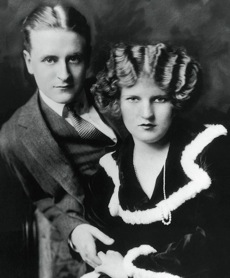I realize that I am not the first to write a biographical themed post about F. Scott Fitzgerald, but that actually makes the idea all the more interesting to me. After learning about Fitzgerald as a person, his writing in The Great Gatsby becomes even more intriguing. Here is a man who created a fictional world that seems to condemn the materialistic lifestyle which he actually lived. Although not as financially secure as Gatsby or the Buchanans, Fitzgerald made enough money to fuel a glamorous lifestyle of parties, which made him a well-known figure in New York, as well as fuel the alcoholism that made him quite the topic at any party. Once, he and his wife kicked out of both the Biltmore Hotel and the Commodore Hotel for being too drunk.

Scott and Zelda. Image from http://thegatesofdamascus.wordpress.com/category/to-scott-to-zelda-letters-from-the-jazz-age/. Used for educational purposes only.
Zelda Fitzgerald, the southern debutante that has been cited as inspiration for Daisy’s character in Gatsby, was also his wife. It is perhaps not the most flattering comparison, but some parallels between Daisy and Zelda are very interesting. When Fitzgerald initially began courting Zelda, with the intention to marry her, she refused due to his lack of money, despite their lengthy long-distance relationship. After he published his first novel, This Side of Paradise, he met Zelda’s standards of wealth to marry. Daisy also turned down a proposal from a man she loved who lacked money, but unfortunately for Gatsby, she never rescinded on her refusal. Perhaps the relationship between Gatsby and Daisy is a cynical look at what could have been. What if he never got his first novel published, or failed to do so before Zelda met another richer man?
Interestingly, five years after Fitzgerald wrote Gatsby his wife was diagnosed with schizophrenia, although modern scholars believe it was actually bipolar disorder, after which she spent the rest of her life in various mental institutions. If Daisy is modeled after Zelda, does this give us a deeper look at who Daisy is as a character?
Whether Zelda is a model for Daisy, or how much of The Great Gatsby can be shown as autobiographical, is nearly impossible to prove. The degree of influence that Fitzgerald’s own life had over his story is debatable. But it seems impossible that the influence didn’t exist. In some degree, it did.
Which begs the big question, how can someone criticize his or her own world so acutely, and still live in it?
– Emily B.
Editor’s Note: If you are interested in learning more about the life and times of Fitzgerald, consider checking out some of the following biographies – all available through the UW Libraries. Scott Fitzgerald: A Biography by Jeffrey Meyers (HarperCollins, 1994), Invented Lives: F. Scott and Zelda Fitzgerald by James R. Mellow (Houghton Mifflin, 1984), or this brand new volume of essays called F. Scott Fitzgerald in Context, edited by Bryant Mangum and published this year by Cambridge University Press.



Interesting connection, Emily. I had no idea that both F. Scott and Zelda were such party animals! Your post makes me wonder– if Daisy has a bit of Zelda in her, through which character(s) does F. Scott filter himself? It would be easy to say Gatsby…but the book is written in first person through the eyes of Carraway, who, like F. Scott, was from the Midwest. While I agree with you that it is impossible (and unfair) to draw definitive connections and interpret the work solely in a biographical manner, it’s an interesting thought experiment.